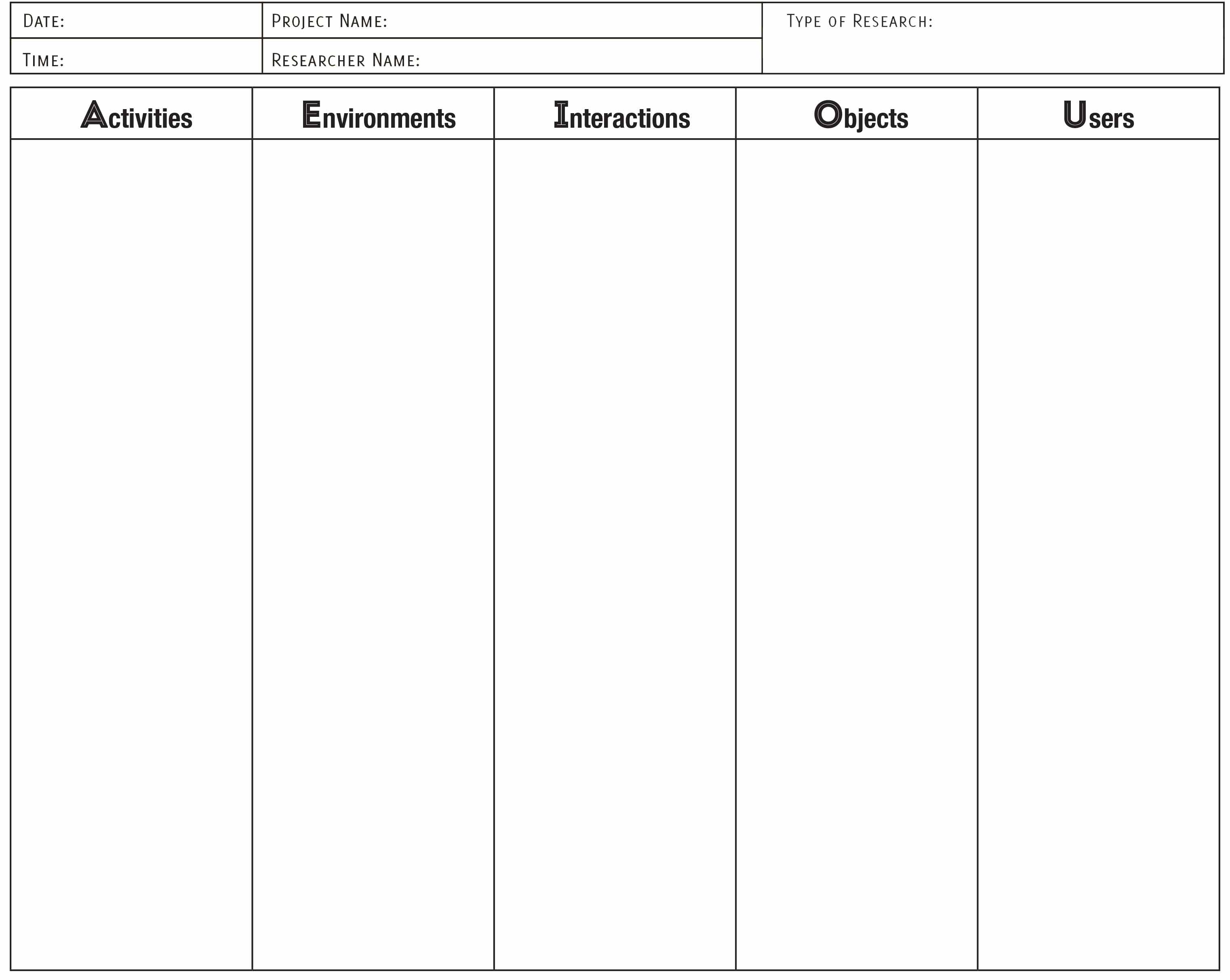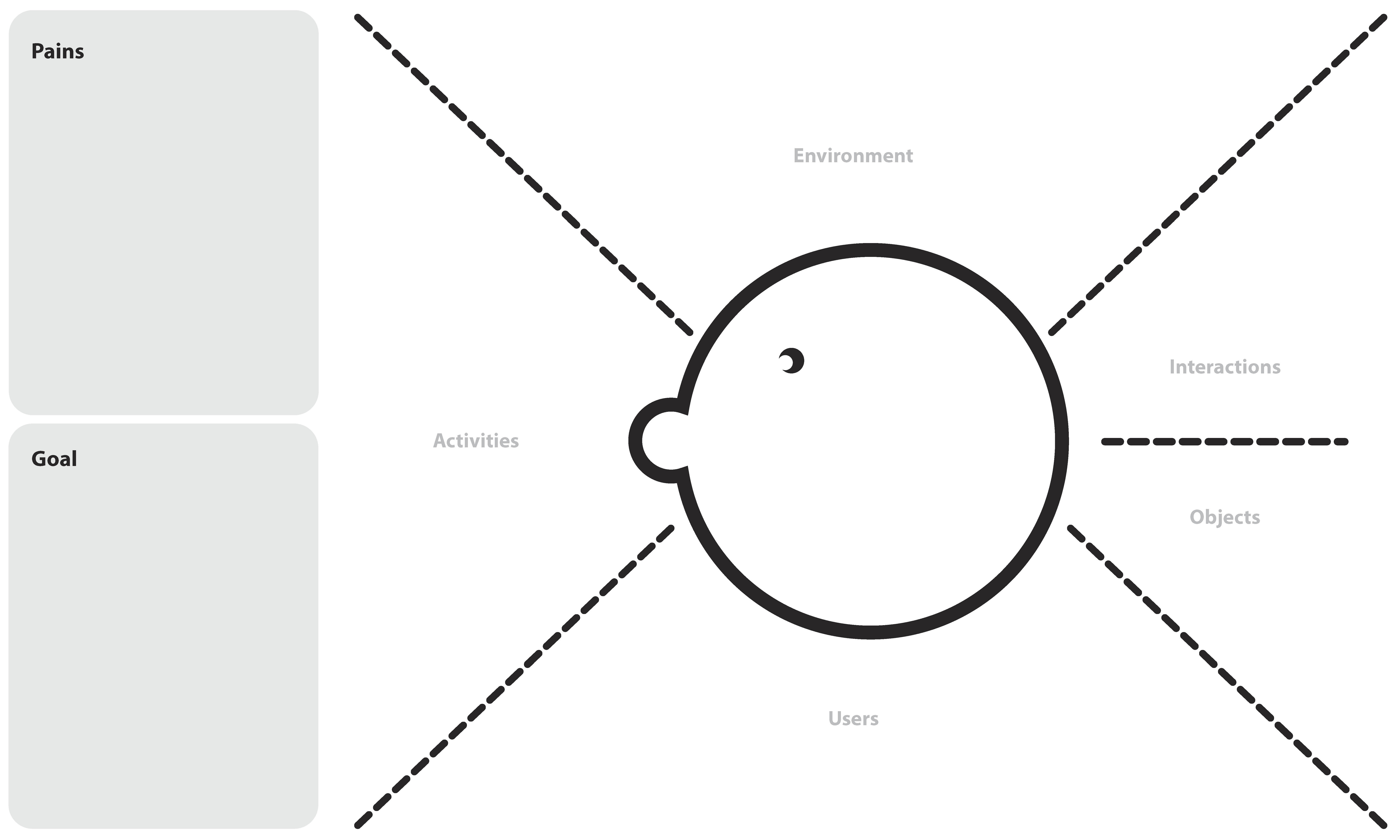AEIOU Observation Framework
A heuristic framework used for ethnographic observations.
Darcie Fitzpatrick
What Is AEIOU Observation Framework?
TheDesignExchange.org put together a really great video quickly describing the AEIOU Observation Framework in less than one minute, so please take a look by clicking the image below:
 That video says it all but for reference AEIOU stands for:
That video says it all but for reference AEIOU stands for:
A - Activities
E - Environments
I - Interactions
O - Objects
U - Users
This heuristic framework provides an observation technique used to document contextual inquiries during ethnographic studies. For the purposes of digital product and software practices, AEIOU is helpful for categorizing and interpreting observations gathered during user research field studies and usability testing efforts. The acronym AEIOU provides an easy to recall mnemonic for how to observe qualitative research, it also quickly turns raw notes into categories that can inform research analysis to develop key insights and other findings.
Why Do AEIOU Observation Framework?
AEIOU relates to five heuristic categories to be observed and documented during user interviews, which provides a guideline for how to capture research data. This outline quickly defines each category:
-
Activities: What actions and behaviors are people taking to reach goals?
-
Environments: What is the overall setting in which the activities are taking place? How are people behaving in the environment?
-
Interactions: What are the basic interactions occurring for people to reach goals? What effect do people have on activities and environment?
-
Objects: What are all the details that form the environment? How do objects relate to people, activities and interactions?
-
Users: Who are the people being observed? What are their personalities like? How do they engage with other people to reach goals?
AEIOU is a starting point for research efforts, the above category definitions can be iterated upon and refined to align with project goals. Rick E. Robinson, creator of AEIOU, calls it a “categorizing heuristic” which can be modified.
How to do AEIOU Observation Framework?
How to conduct a contextual inquiry using AEIOU?
AEIOU provides a template for observing contextual inquiries and collecting qualitative data. Simply use the framework to create a worksheet which can be taken in the field for researchers to utilize. It will help gather observational data in addition to other ethnographic methods such as audio, photos and video.
The worksheet design can be a simple word processing document with added space to take notes in each section, or organized with columns similar to a spreadsheet like this example:
 The worksheet can also be designed in a fun way like this empathy map example:
The worksheet can also be designed in a fun way like this empathy map example:

How to use AEIOU as a methodology?
While AEIOU was not necessarily created to inform methodology it can also provide a guideline for conducting user research. Sometimes with exploratory studies that have lengthy technically specific discussion guides, the data collection is often broad and later analysis will define the categories of information. In this case, AEIOU can be used as a method for aligning a team upon the heuristic observation strategy and planning research data collection. PRO TIP: Include a section on the discussion guide cover page with a quick overview of what to look for. This is a helpful reminder for observers and note takers about responsibilities during a user interview session. These bullets are a good example of what to include and can be modified or added to for alignment with project goals:
- AEIOU Framework (Activities, Environments, Interactions, Objects, Users) * Capture what you see (participant’s body language, artifacts used, etc.) * Capture what you hear in their words (quotes, stories, keywords, contradictions, etc.) * Capture what you feel that the user is feeling (emotions, beliefs, confusion, passion, etc.)
Facilitation Notes
Prerequisite Knowledge
Some idea of the research goals is helpful.
Deliverable
The worksheets will be used to include in research analysis activities.
Supply list:
-
AEIOU Worksheet
-
Printer
Look at AEIOU Observation Framework
Links we love
Check out these great links which can help you dive a little deeper into running the AEIOU Observation Framework practice with your team, customers or stakeholders.

